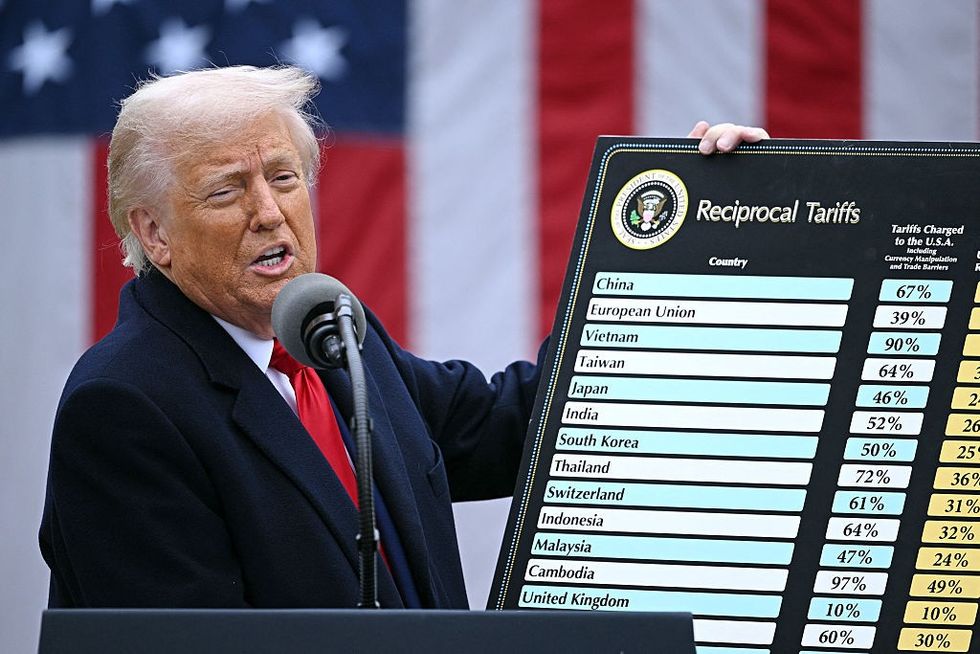Donald Trump says the US has been ripped off by the rest of the world
GB News
ANALYSIS: Donald Trump announced a raft of tariffs against foreign nations as he ratchets up his nationalist and protectionist policies.
Don't Miss
Most Read
Trending on GB News
It has been called 'Liberation Day' for America - but for the rest of the world, global leaders stood with their breath held at the impact on the global economy.
Across the EU, reactions flooded in fast to the news Trump would install 20% tariffs on the EU and 25% on all foreign-made cars.
Ursula Von Der Leyen hit out at the moves which she said would be 'have consequences for the world.'
Donald Trump's relationship with the European Union (EU) has long been fraught with tension and animosity.
While many factors have contributed to this, they are rooted in both his broader worldview and his specific policy goals.
Trump’s disdain for the EU is more than a personal grudge; it’s a reflection of his broader, America-first approach to foreign relations, where he consistently prioritises US interests over international cooperation and global free markets.
We look at the key reasons Donald Trump dislikes the EU and how his views on tariffs could be just the beginning of hardened policies against the European powerhouse.

Donald Trump announces his reciprocal tariffs on the world
GB News
Nationalism and Protectionism
One of the key factors behind Trump’s animosity toward the EU is his deep belief in nationalism and protectionism.
His latest decision to increase tariffs on nations across the world is his biggest move yet to move America towards nationalist and protectionist policies. Championing American jobs and industries and protecting them from foreign competition.
Donald Trump views the EU as part of a globalist system that has threatened American sovereignty and economic interests.
Speaking last night in the Rose Garden at the White House, the President said the EU "was a very tough trader."
He said: "The European Union - very tough traders, you think of them as very friendly - they rip us off, it's so sad to see, it's so pathetic"
The EU, in its attempt to unify European economies, often imposed policies and regulations that Trump views as detrimental to American businesses.
Speaking in the Rose Garden last night, Trump continued: "Through non-tariff barriers the European Union bans the imports of most American poultry, they say we want to send you our cars, we'll send you everything but we're not going to take anything you have."
It's not the first time Trump has been critical of the EU, during Trump's first presidential term he frequently spoke out on the EU's trading practices, particularly its trade surplus.
In 2018, he told EU President Jean-Claude Juncker, "The European Union is, to a large extent, a foe, what they do to us in trade. Now you wouldn’t think of the European Union, but they’re a foe."
Trump's 'America First' mantra, has become the cornerstone of his administration and underscores the idea that international agreements should benefit the US first, something he felt the EU failed to deliver.
The Paris Agreement and Climate Change
Another major point of contention between Trump and the EU has been climate change and the Paris Climate Agreement.
The EU has been a staunch supporter of global efforts to tackle climate change, and the Paris Agreement, which set targets for reducing greenhouse gas emissions is seen as a central pillar of Europe’s environmental policy.
Trump, however, dismissed climate change as a priority and withdrew the US from Paris Agreement in 2017, a decision that was met with strong disapproval from the EU.
Trump’s decision was emblematic of his broader skepticism toward multilateral agreements, which he viewed as constraining American autonomy.
For him, the Paris Agreement was yet another example of the EU trying to impose global regulations that could hurt American industries.
Military Burden Sharing
Trump’s criticism of the EU also extends to NATO, where he frequently called on European allies to increase their military spending.
He argued that the US was shouldering too much of the financial burden of NATO, with European nations not contributing their fair share.
Trump’s 'America First' approach has often painted the EU as a free rider on American military protection, accusing its members of relying on US defence resources while not adequately funding their own military forces.
Tensions have increased with Trump's dealings with the Ukraine and Russia war. In a leaked White House WhatsApp group chat recently Trump's defence secretary Pete Hegseth wrote to Vice President JD Vance: “I fully share your loathing of European freeloading. It’s PATHETIC."
A Desire for Bilateral Deals
Finally, Trump’s preference for bilateral deals over multilateral agreements has been another source of conflict between the EU and Trump.
Throughout his presidency, he expressed frustration with the EU’s bureaucratic structure and its ability to negotiate as a single entity.
Instead, Trump preferred direct negotiations with individual countries, believing that bilateral deals would be more beneficial for America.







